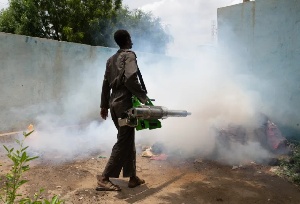Africa News of Tuesday, 3 June 2025
Source: www.ghanawebbers.com
'Corpses rotting in the Nile' as cholera tears through Sudan
After Sudan’s army regained control of Khartoum in March, many people returned home. They wanted to check on their houses and reunite with family.
However, their joy was mixed with shock. Nearly two years under the Rapid Support Forces (RSF) caused significant damage. The RSF has been fighting the Sudanese Armed Forces (SAF) since April 2023. Many Sudanese and the UN recognize SAF as the de facto authority.
In areas where hospitals and stores were looted by the RSF, returnees fell ill.
Omdurman Struggles
Many returnees settled in Omdurman, one of Khartoum's three cities. Living conditions there were slightly better than in other areas. Some localities in Omdurman avoided RSF control, reducing clashes and looting.
However, Omdurman quickly became overcrowded. Dr. Dirar Abeer noted that thousands returned from Egypt alone. This crowding accelerated the spread of cholera, a highly contagious disease endemic to Sudan.
Badawi, a volunteer in Omdurman, reported rotting corpses near the Nile contributing to infections. Cholera has become an epidemic across several states, killing hundreds recently.
The spread is fueled by overcrowding and lack of essential services. Basic sanitation could help stop cholera outbreaks, said Fazli Kostan from Doctors Without Borders (MSF). However, he noted that this is not possible now due to power outages since May 14.
On that day, RSF fired suicide drones that destroyed major power stations. This shutdown water treatment plants and increased cholera cases significantly.
People have resorted to drinking contaminated water from the Nile or rainwater collected from the ground.
Rising Cholera Cases
The SAF-backed Ministry of Health reported a surge in cholera cases between May 15 and May 25. At least 172 people died between May 20 and May 27 alone.
The UN reported daily cases spiking from 90 to over 815 during late May.
Those who contract cholera often rush to hospitals already overwhelmed with patients. Local volunteers say many do not have life-threatening symptoms and should isolate at home instead.
Overcrowding at hospitals worsens disease spread and strains health resources further. Kareem al-Noor, a medic at al-Nao hospital in Omdurman, stated they lack medication and tools for patients.
“The remaining hospitals are full,” he added, “and people wait for treatment on the streets.”
Dr. Abeer believes health authorities are not doing enough against the epidemic despite acknowledging damage caused by RSF actions.
Al Jazeera submitted questions to Dr. Montasser Towarra from MoH about measures being taken but received no response before publication.
Hunger Deepens Crisis
Sudan faces an acute hunger crisis alongside health issues. Millions struggle to feed their families due to war-related destruction of markets and homes.
According to the UN, over half of Sudan’s population—about 25 million—suffers extreme food shortages now.
Hunger weakens bodies and increases susceptibility to diseases like cholera, according to expert Alex De Waal. He warned that hundreds of thousands could die within a year due to these factors.
The UN also cautioned that up to one million children might die from cholera without urgent action against its spread.
Repairing basic services like electricity is crucial for improving sanitation but is not prioritized by military authorities currently controlling Sudan's governance structure.
Al Jazeera asked SAF spokesperson Nabil Abdullah about plans for repairing vital resources but received no clear answers; he redirected inquiries back to MoH instead.
De Waal suspects that military priorities focus solely on combat operations against RSF forces right now.











